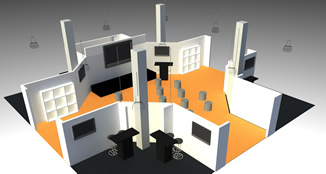ICT at the UN Climate Change Conference
 The UN Climate Change Conference in Copenhagen (COP 15) will have an associated exhibition called "iSeeT @ the Climate Change Kiosk", showing how information and communication technologies (ICTs) can help. I have offered the materials from my Green Technology Strategies Course for the Kiosk.
The UN Climate Change Conference in Copenhagen (COP 15) will have an associated exhibition called "iSeeT @ the Climate Change Kiosk", showing how information and communication technologies (ICTs) can help. I have offered the materials from my Green Technology Strategies Course for the Kiosk.... exhibition at the UN Climate Change Conference - COP 15, 7-18 December 2009, Copenhagen Information and communication technology (ICT) to increase awareness and support action on climate change.
UNFCC) will focus on how information and communication technologies (ICTs) are helping to increase awareness and to support concrete action on climate change in both developing and developed countries.The exhibition will tell stories about current ICT-related projects undertaken by governments, United Nations and other intergovernmental organizations, nongovernmental organizations and media organizations on their own or with private sector partners. Among the contributors are the United Nations (UN), UN Development Programme (UNDP), the UN Environment Programme (UNEP), the UN Institute for Training and Research (UNITAR), the Convention on Biological Diversity (CBD), the International Institute for Sustainable Development's Reporting Services (Earth Negotiations Bulletin) among many others.
The International Telecommunications Union (ITU) is contributing a special programme of daily "business talks" by leaders in the ICT sector from both developing and developed countries.
Theme
Using ICTs as the main theme, the Kiosk will seek to show, display, present and exhibit practical examples of existing and upcoming technologies and practices along with related products and services showing how ICT is and can be used to combat climate change. The Kiosk will also serve to highlight the role that governments, the private sector and civil society are playing in using ICTs to bring about technological innovation and technology transfer to support mitigation and adaptation (e.g. how ICTs are being used to help reduce emissions by replacing unnecessary air travel, in "energy-smart" technologies and in disaster risk reduction).Overall goal
Participants visiting the Kiosk will come away with ideas, information and contacts on practical ways in which ICT is currently helping people around the globe to combat climate change, and what is available that may be applied or transferred to other countries, especially in support of the deal struck in Copenhagen.Programme of demonstrations and presentations
Programme will be developed by the UNFCCC secretariat in cooperation with the Government of Denmark, interested governments, UN organizations, and relevant NGOs accredited to the UNFCCC process. Governments and organizations having established relationships with private sector ICT companies will be able to invite companies to participate in their demonstrations and presentations.The programme will cover up to 11 days of programming and will be managed throughout to ensure a representative presentation of information, including private sector partners.
The programme will be of two types: demonstrations and exhibits of projects and tools in 1 of the 4 thematic demonstration spaces, and presentations on selected topics in a central presentation space.
Demonstration spaces
The demonstration spaces will each be focussed on 4 themes. Each of the 4 spaces will have 2 LCD screens allowing 2 demonstrations to occur at the same time. Each LCD screen will be equipped with a networked laptop connected to a screen and the Internet. A small counter and 2 stools for each of the 2 demonstration areas will accommodate the laptop/staff for each demonstration. It will be possible to distribute a brochure or factsheet.
Demonstration and exhibits of tools may be scheduled for varying periods of time in order to allow as many participants as possible to visit each demonstration, e.g. about 100-200 visitors for each demonstration per day. Demonstration periods are: half day, full day, 2 days.
Themes of the 4 demonstration spaces
- data management and visualization of information for analysis and decision-making;
- collaboration, social networks, e-communities and virtual work groups
- outreach, dissemination, e-government and public participation;
- capacity building and technology transfer to support developing countries, including Internet connectivity and training.
Presentation space
The central presentation space will be equipped with a Cisco TelePresence (CTS 1000) suite - allowing for external presenters to present to participants in the COP 15 venue from 61 countries, and an LCD screen that may be used by presenters to show PowerPoint slides or show a movie on DVD. Some presentation will be webcast on demand on the Internet.
Presentations will be given each day between 13h00-15h00 and 18h00-20h00. Presentation periods will be maximum 1 hour. During periods when presentations are not being given, the central presentation space will be used for half day demonstrations.
Online presence
An online, Internet website will provide a repository for all presentations and demonstrations as well as on demand webcasts.Note to participation
In principle, all contributors to iSeeT@theKiosk must be Parties to the UNFCCC or be participants from approved observer organizations. Any individuals who wish to be present at their respective demonstrations or presentations must be officially registered through their government or observer organization. No funding is available for travel or other expenses that may be related to a demonstration or presentation at the Kiosk.
Information on formats and options for demonstrations will be forthcoming e.g. PowerPoint, video on DVD, etc. ...
From: iSeeT@theClimateChangeKiosk, secretariat of the United Nations Framework Convention on Climate Chang, 2009
Labels: carbon emmissions, Climate Change, Green IT


0 Comments:
Post a Comment
Links to this post:
Create a Link or bookmark with Digg, del.icio.us, Newsvine or News Feed
<< Home